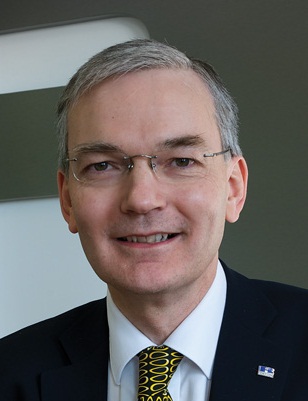Welcome to the ERP Newsletter – December 2014
ERP Member Profile: Neville Jackson, Ricardo
 ERP Member Neville Jackson chaired the recent ERP study on the future of Hydrogen and will chair the new Energy Options for Transport project. Neville says: “I see the role of the Energy Research Partnership in exploring challenges and opportunities in all sectors as a vital part of a future energy system, and the recent focus on Energy for Transport and Hydrogen will provide an important insight into potential cross-sector solutions”.
ERP Member Neville Jackson chaired the recent ERP study on the future of Hydrogen and will chair the new Energy Options for Transport project. Neville says: “I see the role of the Energy Research Partnership in exploring challenges and opportunities in all sectors as a vital part of a future energy system, and the recent focus on Energy for Transport and Hydrogen will provide an important insight into potential cross-sector solutions”.
Neville joined Ricardo in 1982 after graduating from Imperial College London. In his 32-year career at Ricardo he has engaged in leading edge research on combustion engines, hybrid electric systems and power generation. Appointed Chief Technology & Innovation Officer in 2011, his recent focus has been the development of technology roadmaps in a range of sectors and the associated R&D agenda to deliver them.

Whilst Ricardo’s core business is specialist R&D services to the auto industry and related sectors including solar, wind and tidal energy, it also invests about 5% of its total resources into an internal R&D programme focused on longer-term challenges. A significant element of this is collaborative R&D, with support provided by UK, EU and US government agencies; Ricardo engages with governments in all its key markets to share information, and its vision for future technologies and challenges.
Neville is Deputy Chair of the UK Automotive Council Technology Group, and led the team to develop the future UK Internal Combustion Engine Strategy; this directly resulted in the UK Advanced Propulsion Centre, a ten-year £1billion initiative to develop and manufacture high-value low-carbon propulsion systems in the UK. He is also Vice Chairman and executive member of the European Road Transport Research Advisory Council (ERTRAC) and has contributed to a wide range of future European roadmaps and to the definition of future R&D priorities.
Neville Jackson chaired the recent ERP study on the future of Hydrogen and will chair the new Energy Options for Transport project. Neville says: “I see the role of the Energy Research Partnership in exploring challenges and opportunities in all sectors as a vital part of a future energy system, and the recent focus on transport energy and Hydrogen will provide an important insight into potential cross-sector solutions”.
Perhaps the most important challenge for transport is to reduce greenhouse gas emissions. Whilst efficiency improvements and demand management will be part of the solution, reducing the carbon content in transport energy has become a key strategic area – and one of the most difficult to forecast. It is also clear that future transport energy must be part of an integrated energy plan. Renewable energies will be supply limited for the foreseeable future and the needs and options of all energy users must be balanced to reach a successful and equitable solution.
Project Spotlight: Smart Energy
ERP is currently preparing a report looking at the development of a Smart Energy System, which it will be publishing soon. The work follows on from previous ERP projects on Energy Storage and Flexibility and links into current work on Community Energy and Cities.
Being able to control how you use energy and to make effective plans to reduce future consumption is based on having good information. Gathering data, analysing it and acting on it, either in real time or to inform long-term plans, is at the heart of a smart system. In the energy sector, smart is generating a great deal of activity, driven by the opportunity to provide new services to consumers and by the increasing need to manage the distribution networks as more renewable and distributed energy is being deployed.
 Renewable energy is already starting to change the way electricity flows across the network, to the extent that if the current proposals for solar photovoltaic generation are built, in areas such as East Anglia and the South West, then the local distribution networks will be exporting power to the transmission system in the summertime. Demand on the networks will also increase as the uptake of electric vehicles increases and heating potentially becomes electrified.
Renewable energy is already starting to change the way electricity flows across the network, to the extent that if the current proposals for solar photovoltaic generation are built, in areas such as East Anglia and the South West, then the local distribution networks will be exporting power to the transmission system in the summertime. Demand on the networks will also increase as the uptake of electric vehicles increases and heating potentially becomes electrified.
The networks were not designed for this and will require upgrading. The conventional approach would be to uprate the cables and transformers, which will be expensive and disruptive. A smart approach would install monitoring and control equipment linked by a communication system to give visibility to the performance of the network and allow demand to be managed remotely, so as not to overload them. Cables and transformers will need upgrading, but with the right data it can be done in a more planned, and potentially cheaper way.
However, at the moment the wide diversity of activity in smart is not coordinated, with different parts of the market approaching it with different perspectives. This risks options being deployed that may close off other opportunities, or opportunities being missed to join up different parts of the system to deliver efficient solutions.
To avoid this, the report recommends producing a map of the smart landscape, which would identify the various activities and the policies that are driving it, allowing a more coordinated approach to be developed.
The report also emphasises that a whole energy system approach needs to be adopted to ensure the most energy, carbon and cost efficient solutions are identified. This ‘Smart Energy’ approach would consider the potential from integrating different energy vectors, such as using the gas network to deliver energy, capturing of low-grade heat and distributing it through new networks and also the potential of hydrogen, which can be sold into several different markets.
Developing a smart energy system is not easy. Studies suggest that it could be cheaper than other options, but new commercial models will be needed to cover the upfront costs of the deploying the monitoring and control systems. Regulatory intervention may be needed to support investment in the smart energy system, to counter the uncertainties about how the energy system will develop and the policies driving it, along with concerns about consumer uptake and difficulties in evaluating the services that will be needed on the changing electricity system, may mean that flexible.
More details about the project can be found on the Smart Energy project page or by contacting Richard Heap.
ERP Analyst View on… Economic Value Assessments within Low Carbon Pathway works
The UK is renowned for its modelling expertise, which contributes to high quality work across Government, Industry and Academia, with many of these models used to inform energy policy via low carbon pathway and scenario works.
ERP’s recent scoping paper (due to be published, December 2014) suggests that assessments of economic growth and job creation have not been carried out in great depth, and that analysis in this area could be improved – although it is accepted that these effects are complex to measure and define.
 Modelling types and approaches currently (and importantly so) tend to focus on 1) cost‐optimisation and 2) achieving carbon targets. However, in addition to a lack of analysis relating to economic impact, there is also a lack of clarity regarding input assumptions used, which can increase the risk of misinforming policy.
Modelling types and approaches currently (and importantly so) tend to focus on 1) cost‐optimisation and 2) achieving carbon targets. However, in addition to a lack of analysis relating to economic impact, there is also a lack of clarity regarding input assumptions used, which can increase the risk of misinforming policy.
Many existing energy‐system modelling works are not designed to make assessments related to economic impacts (it is not within their remit) and incorporating this type of analysis within particular models is often not seen as feasible. Furthermore, impacts on a regional level within the UK (Scotland, England, Wales etc.) are rarely assessed.
However, it is possible to combine model types to enable economic and socioeconomic analysis, as long as the aims are well defined and modelling limitations are made clear. More could therefore be done to integrate modelling of low carbon pathways with whole economy or ‘top down’ models.
For more information contact Helen K Thomas
Guest Focus: ERP’s Workshop on Demand Side Reduction: Benefits and savings from better use of material resources and energy
In June this year the ERP convened an expert workshop looking at the benefits and savings from the better use of material resources and energy which involved academics, industry and policy makers. From this, a paper has been produced targeted at policy-makers and Special Advisors of political parties, highlighting that appropriate approaches can unleash substantial savings and benefits. It identifies both quick-wins and longer-term recommendations to deliver a more efficient use of materials and energy. The leading academics involved in the production of the paper include: ERP Member Professor. Julian Allwood (University of Cambridge), Professor. Paul Ekins (UCL) and Professor. John Barrett (Leeds University).
The paper states that a new approach to material and energy efficiency could result in annual savings of £0.8 – 8.0billion across the economy, with an additional one-off saving of £0.16 – 1.6billion and that households could save up to £2,000 each per year. All this could be achieved using existing materials and without the need for any technological breakthroughs.
Analysis is increasingly recognising that one of the quickest ways to improve resource and energy security, whilst enhancing long-term economic growth and decarbonising the UK economy, is to reduce the consumption of materials and energy. In some areas, quick wins might be possible through small nudges in policy frameworks. However, long-term reduction will require a policy framework based on absolute reductions in energy consumption, to avoid unintended consequences such as increased consumption as a function of cheaper cost and the offshoring of emissions.
The recommendations have implications across government departments, industry and society sectors and are intended to help inform policy development – these include:
- Shifting taxation from economic positives, such as employment, income and investment, to environmental negatives such as pollution or the use of scarce resources.
- Encouraging the light weighting of cars, which should be recognised as a priority in efforts to reduce emissions from cars.
- In the infrastructure sector, driving down over-specification and promoting more holistic material accounting.
- Raising awareness of ways to avoid food waste and reducing food packaging.
- In government procurement, setting specific targets for an absolute annual reduction in emissions across an organisation including from those embedded in the products acquired.
The views expressed do not represent the position of any particular organisation, but are intended to contribute to informed government policy-making.
The document presents three sector-specific opportunities and two economy-wide options. Identified by a group of industry, academic and policy experts, these represent the top five opportunities, which were considered achievable and result in a net CO2 reduction.
ERP Activities Update
ERP Projects
A list of ERP’s current & ongoing projects include:
- Buildings Technologies
- Social & Political Barriers to uptake: Community Energy
- Cities
- Smart Energy
- Energy Options For Transport
- Managing Flexibility of the Electricity System
- An Economic Value Assessment of Low Carbon Pathways
- Resource Use Strategies – Minerals & Nexus
- International Engagement
- Public Engagement
- CO2 Enhanced Oil Recovery (EOR) (web page to be added soon)
Guests at recent ERP Plenary Meetings:
- At ERP’s Annual Dinner in July 2014, Member Julian Allwood from the University of Cambridge presented on the topic of Demand Reduction. A key message from the talk was that in contrast to the technical difficulty of finding a supply side solution to mitigating climate change, the technical specification of a demand side solution is relatively easy.
- At ERP’s Plenary Meeting in October 2014, guest Oonagh Werngren from Oil & Gas UK presented to ERP Members about the Oil and Gas Technology Leadership Board (TLB), including its remit and objectives, plus information regarding why technology is important and the TLB’s priority technology areas.
Activities & Workshops
ERP’s Workshop on Public Engagement – July 2014
Following the publication of the public engagement report in May 2014, ERP held a workshop to explore how to develop a Strategic Narrative for the transformation of the energy system.  The need for a high-level narrative was supported, by industry and academics. However, it was clear from the discussion that this is a relatively unexplored concept at a national scale, which led to varying opinions as to how to achieve it. ERP is continuing to work on this and is in discussion with industry and engagement practitioners to develop the idea further.
The need for a high-level narrative was supported, by industry and academics. However, it was clear from the discussion that this is a relatively unexplored concept at a national scale, which led to varying opinions as to how to achieve it. ERP is continuing to work on this and is in discussion with industry and engagement practitioners to develop the idea further.
ERP’s Work on Managing Flexibility of the Energy System – Activities November 2014
The conclusions beginning to emerge from ERP’s project on Flexibility have been shared in three different fora, attracting interest and debate amongst very different audiences.

1. On November 14th, Lead Project Analyst Andy Boston sat on a panel that looked at renewable grid integration issues at an event in Brussels called “The EU Energy Challenge: Can Innovation Fill the Gap?”. This conference was the culmination of 8 smaller Round Table events hosted by BP over the past year and attracted speakers such as The European Commission’s Director General of Energy Dominique Ristori, the UK Government’s Chief Scientific Advisor Sir Mark Walport, and Princeton’s Robert Socolow. The grid integration panel discussed (with approximately 100 attendees) the same issues that are currently being addressed in ERP’s project work.
2. A week later, ERP Co-Chair Keith MacLean addressed the Gas to Power UK Forum and highlighted how the issues surrounding the integration of renewables will affect gas plant on the system and the support role it can offer. Some of the conclusions from the modelling of gas-CCS demonstrated the role it can play if operated flexibly to deliver reserve and response services.
3. At the end of November a workshop on Managing Flexibility of the Electricity System was held for the modelling experts within ERP’s membership and and some additional invited guests. Forty delegates “looked under the bonnet” and examined the assumptions behind the modelling and the robustness of the conclusions. There was a debate on what this means for policy makers and grid operators.
Looking forward, the project will examine the feedback received at the workshop, make adaptations where necessary and publish a concluding report, complete with recommendations, early next year. ERP would like to thank workshop guests for their input.
The ITRC, ERP & UKWRIP Workshop on: Energy & Water Infrastructure Interdependencies
The Energy Research Partnership (ERP), UK Water Research and Innovation Partnership (UKWRIP), University of Bristol System Centre and The Infrastructure Transition Research Consortium (ITRC) have been undertaking and / or exploring work in the interdependencies / nexus space.
On the 2 December, academics, representatives from the Energy and Water Industry, policy makers and members of regulatory bodies assembled at the Royal Academy of Engineering for a day long workshop. The primary objectives of the workshop were to:
- Better define interdependencies
- Identify their implications for current and future energy & water infrastructure investment, management, design and implementation
- Identify sources and patterns of interdependent disruptions or failures and discuss ways of preventing them
- Agree on possible governance tools – platforms, mechanisms andcommunities to facilitate closer cooperation between the two sectors.
The workshop will help to inform ERP’s project work on Resource Use Strategies. The intended outputs will include:
- Policy Briefs for state of understanding for respective sectors capacity, risks and opportunities
- Knowledge exchange platforms
- Bi-lateral and multi-lateral platforms between industry, academia (iCiF and iBuild) and governance sector
Any questions regarding the workshop should be directed at mark.workman@erpuk.org
ERP Leaders’ Forum – September 2014
The ERP held its first Leaders’ Forum on 10th September, on the topic of Energy for Transport. The purpose of these newly introduced events is is to bring together senior members of ERP organisations, along with guest speakers, to discuss important research topics for the energy sector. The events help to ensure ERP’s ability to engage at the highest level and communicate agreed priorities effectively. ERP’s intention is to hold up to two Leaders’ Fora each year.

The guests at the recent transport event were Baroness Kramer (Minister at DfT) and Professor Parry-Jones (Chairman of Network Rail), who provided overviews of the challenges facing the transport sector, focussing on the development and deployment of new energy technologies.
Discussion took place amongst attendees regarding a wide range of topics, including:
- The merits of regulating for outcomes rather than solutions, to give industry the freedom to find optimal approaches;
- The economics of technology in a transition period, i.e. deciding whether to invest in established technologies (that might become stranded assets), or newer technologies (that might not be successful, or that might be a precursor to more profitable technologies);
- The challenges facing rail (primarily capacity), and how they can be addressed (mainly through electrification, but also digitalisation);
- The challenges facing road transport (primarily emissions, affecting both climate and air quality), and the role of ultra-low emission vehicles (ULEVs) in providing “and solutions” (that give customers the expected levels of utility e.g. safety and convenience, and lower emissions);
- The need for better links between the transport and energy sectors (at all levels, in industry and in government) in order to better understand the growing interactions between the two sectors.
The meeting initiated several discussions that ERP Members are following up on, and posed important questions that will be considered within ERP’s project on Energy Options for Transport.
Other News
- New ERP Co-chair: ERP are pleased to introduce our new ERP public-side Co-chair – Professor John Loughhead OBE FREng FTSE. John was recently appointed Chief Scientific Advisor at DECC and has previously been involved with ERP as one of our Members. View John’s biography on the DECC website.
- New ERP Team Member – Tom Watson: Tom Watson has joined the ERP Analysis Team for 5 months to assist the team with the Energy Options for Transport project. Tom will present to ERP Members on initial findings from the project work in April 2015. Tom is on secondment from the Policy Studies Institute (PSI) where he continues to work one day a week as a Research Associate. At PSI he was a co-author of Scenarios for the Development of Smart Grids in the UK, a two-year UKERC-funded project that employed a range of research techniques to develop sociotechnical scenarios for a smarter energy system to 2050. In addition, he has carried out work on the evaluation of complex policies for Defra and the role that trade associations play in the development of climate legislation. Tom has a Philosophy degree UCL and a Master’s in Energy Policy from Exeter.
- And finally… The new ERP website has now been launched – December 2014: The new ERP website has been launched today, Thursday 11 December 2014. The website showcases all of ERP’s projects and activities and includes information About ERP and our Members. The new site has introduced us to the world of Social Media, so please follow us on Twitter or connect via LinkedIn.Please take a look at the new site here and tell us what you think!
Season’s Greetings from the ERP Analysis Team.
